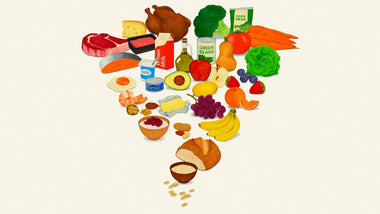Why You Can’t Trust the FDA to Help You Make Good Choices for Your Health
If you’re trying to figure out how to make healthy choices, it’s time to stop listening to the FDA.
Why? Because despite the significant advances in nutrition science over the past 20 years, the rules the FDA uses to determine if something is good for you are still based on research that’s more than two decades old.
That means all of the nutritional information and packaging claims you’ll find on the foods you buy today — which you use to make purchasing decisions for you and your family — are based on nutritional science that’s completely out of date.
Twenty years ago, health was defined only by the categories of nutrients you’ll find on today’s nutrition panel: calories, fiber, fat, saturated fat, sodium and cholesterol, plus a handful of vitamins and minerals including vitamin C and calcium.
Today we know those all matter, but we also know that hitting a few benchmarks through highly processed, fortified foods isn’t making us healthier. And we now know the sources of those nutrients are at least as important as the nutrient numbers themselves.
Packaging claims are just as outdated. Those claims are based on benchmarks of nutrient inclusion without any consideration for the adverse effects of other ingredients. In addition, the claims can be qualified with an asterisk, allowing a food to boast a health benefit without meeting the total nutrient amount needed.
To make our point, let’s look at a very popular “healthy” breakfast cereal: Honey Nut Cheerios. Honey Nut Cheerios displays a large red heart on its box front with a health claim that it “can help lower your cholesterol*.” This cholesterol claim is based on only one ingredient, oats, which contain soluble fiber.
Notice the asterisk? That little symbol leads you to the following statement:
*3 grams of soluble fiber daily from whole grain oat foods, like Honey Nut Cheerios cereal, in a diet low in saturated fat and cholesterol, may reduce the risk of heart disease. Honey Nut Cheerios cereal provides .75 grams per serving.
So it would take 4 bowls of cereal– not 1 bowl as the package suggests — to get the amount of soluble fiber needed to actually affect health.
Additionally, Honey Nut Cheerios contains 9 grams of added sugar in a 28 gram serving. So one-third of a serving of this “heart healthy” cereal is made of added sugar. Thanks to years of research, we now know that added sugar drives up cholesterol.
So does the small amount of soluble fiber in Honey Nut Cheerios really help lower cholesterol? Or does the added sugar raise it?
These kinds of contradictions are why the FDA is beginning the process of re-evaluating what it considers to be “healthy”. But it will be years before any shift in FDA policy takes place, let alone makes its way onto packaging labels.
And this is why at Step One Foods we’re committed to complete transparency and to always delivering the right nutrients in the right amounts from the finest ingredients. Our ingredient choices and nutrient metrics are based on the most up to date nutrition research. FDA health claims? That’s so 1990.

Tested & Proven Results.
- Cardiologist formulated
- Supported by over 500 publications
- Clinically-proven, in a double-blind randomized trial with Mayo Clinic and The University of Manitoba
80% of participants lowered their cholesterol in just 30 days. With just two servings per day, Step One Foods offers a proven-effective way to naturally lower LDL (bad) cholesterol.
Get heart health tips and articles like this, delivered right to your email.
New articles every week.
You may also like...

Why Most New Year’s Resolutions Fail - And How to Right-Size Yours

You don’t need to avoid foods with cholesterol…except for these



